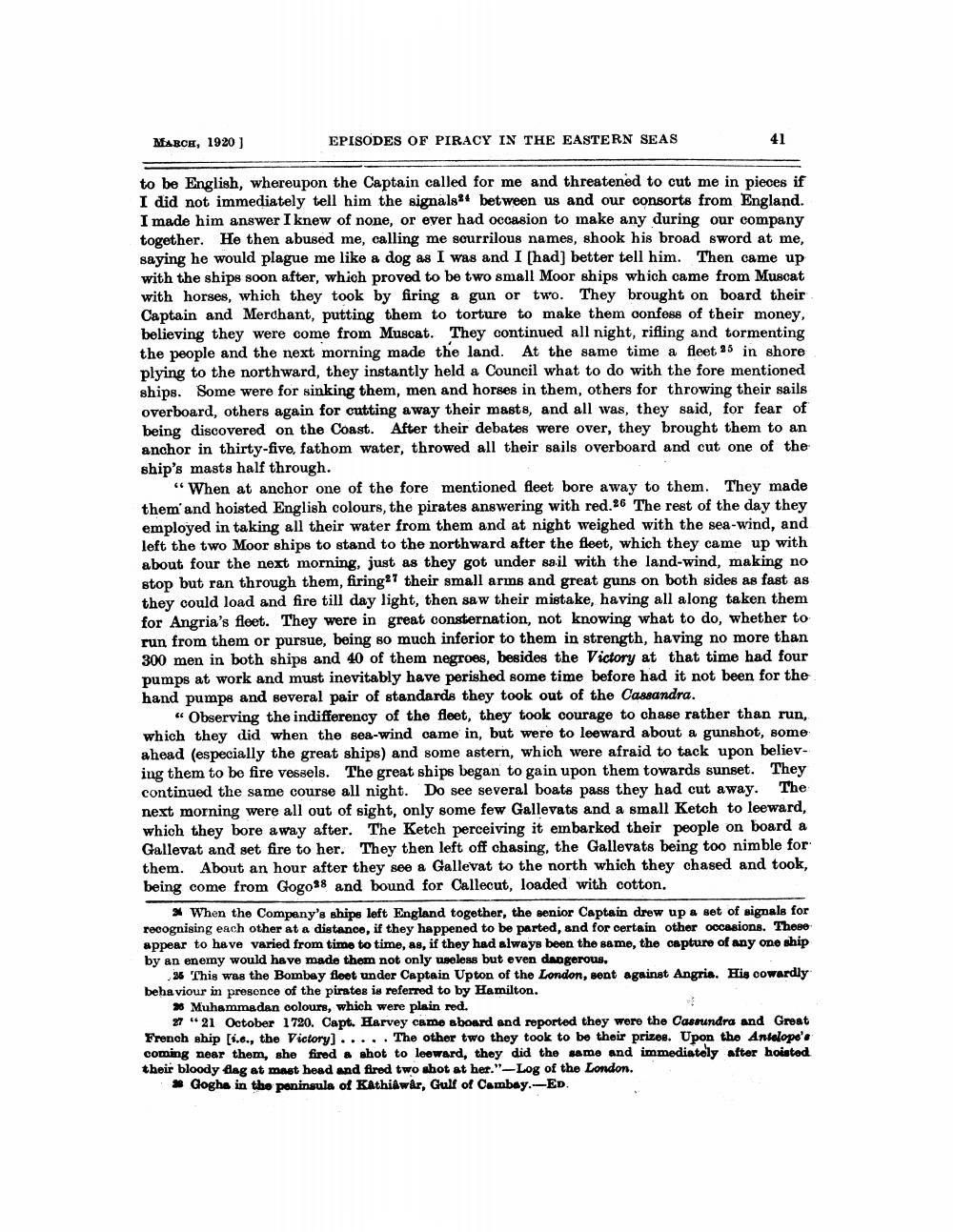________________
MARCH, 1920 ]
EPISODES OF PIRACY IN THE EASTERN SEAS
41
to be English, whereupon the Captain called for me and threatened to cut me in pieces if I did not immediately tell him the signals4 between us and our consorte from England. I made him answer I knew of none, or ever had occasion to make any during our company together. He then abused me, calling me scurrilous names, shook his broad sword at me, saying he would plague me like a dog as I was and I [had) better tell him. Then came up with the ships soon after, which proved to be two small Moor ships which came from Muscat with horses, which they took by firing a gun or two. They brought on board their Captain and Merchant, putting them to torture to make them confess of their money, believing they were come from Muscat. They continued all night, rifling and tormenting the people and the next morning made the land. At the same time a fleet 35 in shore plying to the northward, they instantly held a Council what to do with the fore mentioned ships. Some were for sinking them, men and horses in them, others for throwing their sails overboard, others again for cutting away their masts, and all was, they said, for fear of being discovered on the Coast. After their debates were over, they brought them to an anchor in thirty-five, fathom water, throwed all their sails overboard and cut one of the ship's masts half through.
“When at anchor one of the fore mentioned fleet bore away to them. They made them' and hoisted English colours, the pirates answering with red.26 The rest of the day they employed in taking all their water from them and at night weighed with the sea-wind, and left the two Moor ships to stand to the northward after the fleet, which they came up with about four the next morning, just as they got under sail with the land-wind, making no stop but ran through them, firing their small arms and great guns on both sides as fast as they could load and fire till day light, then saw their mistake, having all along taken them for Angria's floet. They were in great consternation, not knowing what to do, whether to run from them or pursue, being so much inferior to them in strength, having no more than 300 men in both ships and 40 of them negroes, besides the Victory at that time had four pumps at work and must inevitably have perished some time before had it not been for the hand pumps and several pair of standards they took out of the Cassandra.
“ Observing the indifferency of the fleet, they took courage to chase rather than run, which they did when the sea-wind came in, but were to leeward about a gunshot, some ahead (especially the great ships) and some astern, which were afraid to tack upon believing them to be fire vessels. The great ships began to gain upon them towards sunset. They continued the same course all night. Do see several boats pass they had cut away. The next morning were all out of sight, only some few Gallevats and a small Ketch to leeward, which they bore away after. The Ketch perceiving it embarked their people on board a Gallevat and set fire to her. They then left off chasing, the Gallevats being too nimble for them. About an hour after they see a Gallevat to the north which they chased and took, being come from Gogo38 and bound for Callecut, loaded with cotton.
* When the Company's ships left England together, the senior Captain drew up a set of signals for recognising each other at a distance, if they happened to be parted, and for certain other occasions. These appear to have varied from time to time, as, if they had always been the same, the capture of any one ship by an enemy would have made them not only useless but even dangerous.
26 This was the Bombay floot under Captain Upton of the London, sont against Angria. His cowardly behaviour in presence of the pirates is referred to by Hamilton.
» Muhammadan colours, which were plain red.
27 " 21 October 1720. Capt. Harvey came aboard and reported they were the Casrundra and Great French ship [6.6., the Victory]..... The other two they took to be their prizoe. Upon the Antelope's coming near them, she fired a shot to leeward, they did the same and immediately after hoisted their bloody flag at mast head and fired two shot at her."-Log of the London.
Gogha in the peninsula of Kathiâwâr, Gulf of Cambay.--ED.




